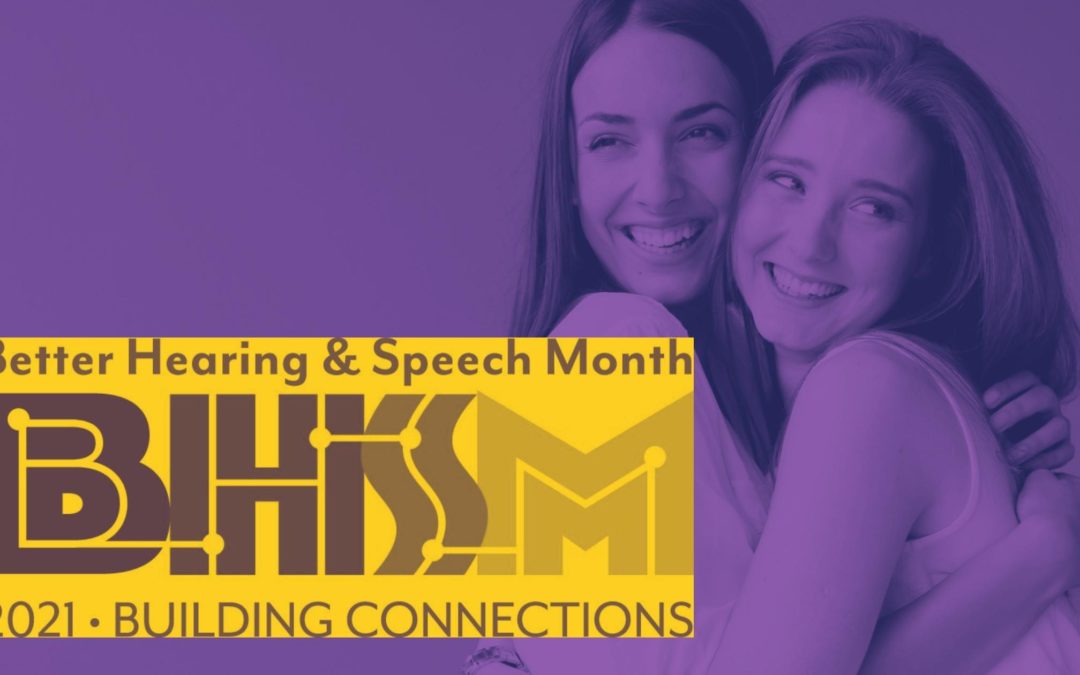May is all about hearing health! Each May is Better Hearing and Speech Month, a campaign organized by the American Speech-Language-Hearing Association (ASHA). ASHA is invested in raising awareness about hearing loss, one of the most pervasive medical conditions that people experience today.
Themed Building Connections, the campaign invites people to learn about hearing health and simple ways it can be prioritized. Nearly 1 in 5 people have some degree of impaired hearing, which impacts an estimated 48 million people nation-wide. By practicing hearing health care, you can significantly reduce the risk of its development!
Understanding Hearing Loss
Hearing loss is the third most common chronic medical condition that older adults navigate today. It can be caused by several factors including environmental exposure to loud noise, existing medical conditions, aging, genetic history, and head injuries. Because it usually develops gradually, it can remain untreated for quite some time. According to a new poll commissioned by ASHA: more than half (51%) of all adults reported having hearing problems, but only 11% of those respondents have sought treatment.
Untreated hearing loss can have numerous effects on overall health and wellness. Not only can the impairment worsen, making hearing even more challenging, but untreated hearing loss can also lead to:
- social withdrawal, depression, anxiety
- strained relationships
- cognitive decline
- unemployment and/or underemployment
Treating hearing loss as early as possible can prevent the toll it often takes on all aspects of life. We are invested in offering effective hearing solutions that not only improve hearing ability but overall wellness.
Benefits of Treating Hearing Loss
There are countless benefits of treating hearing loss. Some of the major ways that quality of life is profoundly enhanced includes:
Strengthened Communication – Treating hearing loss addresses and alleviates the symptoms that strain communication: tinnitus (a buzzing or ringing like noise in the ears), slurring of sound, pretending to hear, asking others to speak loudly etc. These symptoms can become incredibly disruptive, preventing people from comfortably engaging in conversations.
The most common treatment for hearing loss is hearing aids. These medically prescribed devices absorb and process sound which provides significant hearing support. This maximizes hearing capacity, allowing people to engage in communication more effectively. Effective communication improves relationships, social life, job performance etc.
Enriched Social Life – Social withdrawal is a common effect of hearing loss. Symptoms can be experienced mildly to severely which can make conversations really difficult (and exhausting) to navigate. Strained communication often leads to avoiding conversations and social interactions entirely. This results in retreating from social activities and spending less time with family and friends. Social withdrawal can impact relationships as well as mental health. Isolation contributes to depression, anxiety, loneliness etc.
Treating hearing loss enables people to fully participate and communicate with others, alleviating the kind of fatigue and confusion that leads to social withdrawal. Being able to move through conversations with greater ease boosts a sense of self and independence. This supports people to reengage with others and in social life more confidently and comfortably.
Improves Relationships – Increased hearing capacity and effective communication also improve relationships. Effective communication is the foundation for healthy relationships and connections. Being able to share and be present in the intimacy of conversations, easily communicate your thoughts, and hear what others are sharing nurtures relationships.
Improves Overall Health – Untreated hearing loss can impact different facets of health in a variety of ways. Research shows that there hearing loss often increases the risk of developing other health conditions including:
- Cognitive decline: there is a link between hearing loss and cognitive decline. Hearing loss can contribute to the development of dementia.
- Depression: a 2015 study found that depression was more than twice as likely among people who had hearing loss.
- Accidental injuries: a 2012 study found that people with mild hearing loss were 3 times more likely to have a history of falling.
Treating hearing loss reduces the risk of these health concerns. Additionally, using hearing aids is beneficial for cognitive abilities, increases spatial awareness, and general safety.
Treatment begins with the simple step of scheduling an appointment for a hearing test. Contact us today and prioritize your hearing health this month!


